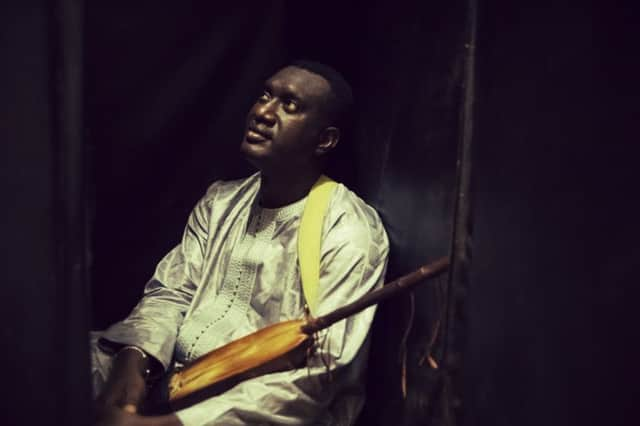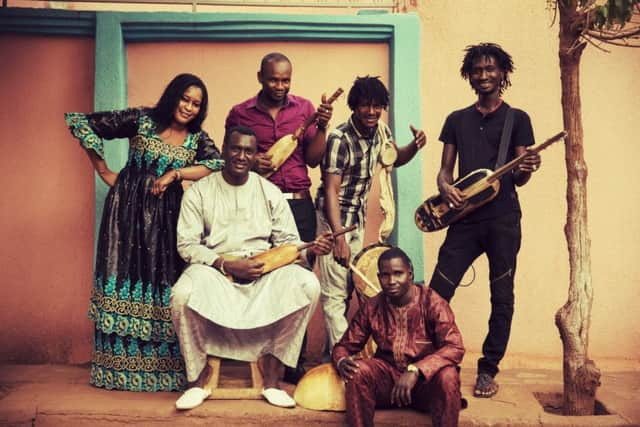Bassekou Kouyate: '˜In Mali we pass on our tradition and our history to our kids'


Bassekou Kouyate has been among West Africa’s most successful musical exports. Hailing from the Barouéli Cercle region of Mali, he began performing in Europe 30 years ago and released his debut album Segu Blue to considerable acclaim in 2007.
It earned him two prizes, for Album of the Year and African Artist of the Year, at the 2008 BBC Radio 3 Awards for World Music, and in the 11 years since, Kouyate and his band, Ngoni Ba, which includes his wife Amy Sacko and son Madou, have gone on to make four more albums and tour the world.
Advertisement
Hide AdAdvertisement
Hide AdIn 2012 Kouyate was part of Damon Albarn’s Africa Express project, which aims to encourage collaboration between musicians from different countries and genres. Later this month the 52-year-old, dubbed ‘the wizard of the ngoni’, is due to perform at the Howard Assembly Room in Leeds.


Your new album, Miri, is closer in sound to your first record, Segu Blue. After some ‘rock ’n’ roll’ experiments in recent years, were you keen to go back and re-explore your musical roots?
“When I made this album I had this image of myself in my head of sitting at the Niger river near my home town Garana, thinking about what is going on in this country. A number of songs are quite thoughtful and talk about values and things that are really close to my heart. I felt I could better express these things and this mood with a more rootsier sound and a sound that is real close to the roots of my music that I come from.”
Mali has been through turbulent times since the military coup and Tuareg rebellion in the north of the country in 2012. Were you trying to address where you think Malian society is today in songs such as Wele Ni and Konya?
Advertisement
Hide AdAdvertisement
Hide Ad“Exactly why does everybody fight, why the violence? We are in such a beautiful country, we are a democracy, everyone can say what is on their minds – please, brothers and sisters, do that.”
There are also songs about peace and friendship. Are you hopeful of an end to conflict in Mali in 2019?
“I am sure that we will find a way to make our beautiful country return to peace. We Malians are very strong in forgiving, we Malians are very strong in finding a solution. Jealousy is destroying Africa, we have to find a place in our heart where we can forgive, that is very important.”
Yakare is perhaps your most personal song on this album. Did you want to put into words how much your mother – and family – have meant to you over the years?
Advertisement
Hide AdAdvertisement
Hide Ad“It is very true this song is very close to my heart. If you talk about your mother, the mother is like a door of your house it is there to protect you. If your mother dies it is as if your house does not have a door any more. Everyone can enter – bad guys, good guys, it is to say that she has done a lot for me and also for the community of Garana, my home village. She worked hard for peace in the community. If there were problems between couples she helped to sort things out.
“She was a pillar of society. Now we have to take care of our problems ourselves, not only me but also the people in Garana. All we can do is sing for her. She left a good example for everyone.”
There are a number of guests on Miri including your old friend Habib Koite. Do you feel the pair of you have a deep-rooted musical connection?
“We started to work together 1988. We went to Dranoute together a folk festival to play our first gig in Europe together with Toumani Diabate. That was with Symmetric Trio. Since then we have been friends and following what everyone has been doing. He loves my music, I adore his voice and the way he plays guitar. I have played on his album and now I invited him to play on mine. It was a great collaboration to do the Kanto kelena for my new album, Miri. I think it is very good and, like all of this new album, really close to my heart.”
Advertisement
Hide AdAdvertisement
Hide AdHow did the collaboration with Yasel Conzalez Rivera of Madera Limpia come about?
“Well you know my son Madou also is into this new afrobeats rap thing the youth also here in Mali is crazy about. We had this idea of a Cuban song. First I wanted to ask Eliades Ochoa to sing on the song but then we decided it might be fun to blend that with a more contemporary singer. So my producer Jay suggested these reggaeton guys from Guantanamo he had been working with and it’s great, I feel!”
Your band, Ngoni ba, is very much a family affair. Did it seem very much a logical step for your wife Amy and son Madou to be involved in your touring group?
“I am very proud of playing with my family. It is quite normal form me because music is in our family. Here in Mali with us the jelis (Griots) it is what we do we pass on our tradition and history of the country to our kids. I learnt from my dad, my dad learnt from his dad, his dad learnt from his dad etc and it is the same with me and my kids. If you work with your family you are the head of the family, everyone respects you. But we also discuss things because the music has to be good for the future as well.”
Advertisement
Hide AdAdvertisement
Hide AdThe ngoni has a long history in Malian music. Were you encouraged by your father to first pick up the instrument?
“I learnt the ngoni from my father Moustapha Kouyate. When I was around 10 years old he gave me an ngoni but I really liked to play soccer those days. So while my dad was teaching some kids the ngoni I went out to play soccer. In the evening I came back and practised what everyone had learnt that day. It was easy for me, I somehow could pick it up easily. My dad taught me everything but he did not force me. He really believed in me – one day he even told my mother Yakare: ‘Yakare you will see one day this boy will be a really great ngoni player.’”
Do you think some of the ngoni’s appeal lies in that exchange of knowledge between generations?
“The ngoni is the first and oldest instrument of the griots in Mali. We used to play the ngoni for the king and great warriors of Mali. The ngoni has existed even before Christ was born in Mali. It is the oldest griot instrument in our country. The very first instruments only had one string, then two then three then four. My great grandfather played with three strings, my father used four strings. Me, I play with up to seven or even nine strings on my ngoni.
Advertisement
Hide AdAdvertisement
Hide Ad“The instrument evolves all the time. We added a lot of things, distortion and wah wah pedals all that stuff, I added that. The people here have really appreciated that. You can play any kind of music with the ngoni today, blues, jazz, classical music. My ancestors never had the idea to make this instrument heard internationally but that is my mission. I want the world to hear and appreciate this great instrument.”
It’s 30 years since you played your first concert in Europe. Do you think European audiences, and musicians, have become more receptive to African music over the last three decades, and have projects such as Africa Express helped to spread the word?
“You are right it has been 30 years that I am lucky to travel the world with my music, to go to Europe the US, Asia, I even went to India over new year, it was amazing. There are many people in the world who love African music, some even say it is like a medicine – if you have stress or are ill you can listen to our music and your stress will be gone. Try it, for instance with the song Miri on my new album, I recorded it picturing myself sitting at the Niger river contemplating about life.
“People don’t understand the lyrics but they hear the melody and the feel of the music. Here in Africa people understand every word and listen to that too. People in Europe listen with their hearts.
Advertisement
Hide AdAdvertisement
Hide Ad“Africa Express is really, really important for African music also for Malian music. The Africa Express team has created a lot of attention for African music. They came with a lot of press and television and got people really excited for our music here, for the power and the liveliness of African music and the many, many things it has to offer. Thanks you, Damon, thank you everyone who works in the Africa Express team.”
Bassekou Kouyate plays at the Howard Assembly Room, Leeds on January 26. bassekoukouyate.com